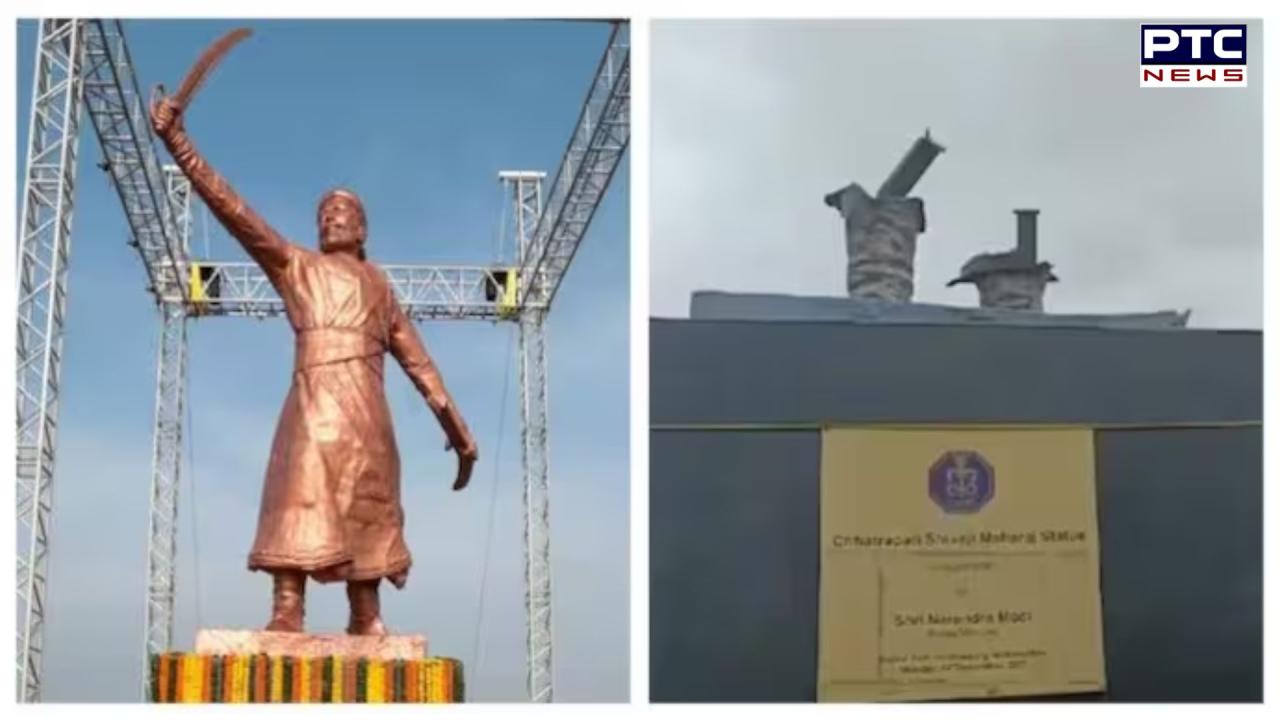- February 23, 2025
- Updated 2:22 am
Shivaji statue collapse: Search for culprit sparks blame game among agencies
PTC News Desk: The sudden collapse of a 35-foot statue of the 17th-century Maratha warrior king Chhatrapati Shivaji Maharaj at Rajkot Fort in Maharashtra’s Sindhudurg district on August 26 has triggered a major controversy and blame game among various governmental agencies.
The statue, which was inaugurated by Prime Minister Narendra Modi on December 4 of the previous year during the Navy Day celebrations, collapsed due to structural failures, raising significant questions regarding the statue’s maintenance and oversight responsibilities.
In-Depth Investigations and Accusations
Following the collapse, various media outlets launched extensive investigations to uncover the reasons behind the incident and to identify the parties responsible for the statue’s upkeep. A special panel has been formed to investigate the circumstances surrounding the collapse. Already, the Indian Navy and the Public Works Department (PWD) have begun pointing fingers at each other.
Ajit Patil, an assistant engineer with the PWD, filed a formal complaint at Malvan police station concerning the incident, which led to the registration of a case under multiple sections of the Bharatiya Nyay Sanhita (BNS), highlighting the severity of the matter.
As the blame game intensifies, Chetan Patil, who was responsible for the structural audit of the statue, was arrested. He has reportedly informed the police that he had only designed the platform for the statue, and this design was submitted to the Indian Navy through the PWD.
The statue’s construction, which was completed in just three months, was overseen and funded by the Indian Navy, with the work contract awarded to contractor Jaydeep Apte. However, confusion and controversy have erupted over the subsequent maintenance responsibilities for the statue.
Responsibility Dispute Over Maintenance
The Maharashtra state government and the Indian Navy have been trading accusations about who is to blame for the statue’s poor condition and eventual collapse. Despite concerns about the statue’s deteriorating condition, there appears to have been no clear action or maintenance efforts by either party in the months leading up to the collapse.
After the statue’s inauguration, the site became a popular attraction, drawing over five lakh visitors to Rajkot Fort. However, there was ongoing ambiguity about who was responsible for the statue’s maintenance. According to the FIR, the PWD conducts regular inspections of Rajkot Fort.
During an inspection on August 20, the PWD identified rusted nuts and bolts on the statue. Despite sending a letter to the Navy on August 22 regarding the statue’s condition, no immediate action was taken, resulting in the statue’s collapse four days later—a disaster that might have been avoided with timely intervention.
Indian Navy officials have stated that the statue was designed by experts and was a collaborative effort between state government agencies and the Navy. After the statue’s unveiling, the responsibility for its maintenance was supposedly handed over to the local administration. The Navy also asserted that its role ended after the statue’s inauguration and that maintenance duties were the responsibility of state government agencies.
However, PWD sources countered that the statue, built by the Indian Navy with a contracted builder, was constructed specifically for Navy Day. They argue that while the PWD handles general maintenance of the Rajkot Fort premises, the statue’s upkeep was supposed to fall under the Navy’s jurisdiction.
Maharashtra Chief Minister Eknath Shinde initially attributed the statue’s collapse to strong winds and heavy rainfall, adding another layer of complexity to the ongoing dispute.
Details from the FIR
According to the FIR, contractor Jaydeep Apte had undertaken repairs on the statue as recently as June, but it remains unclear whether these repairs were authorized by the Indian Navy or the PWD. Furthermore, no official order appears to have been issued outlining who was responsible for the statue’s care post-inauguration.
The statue, constructed with nuts and bolts, had suffered significant corrosion due to exposure to rain and sea salt, compromising its structural integrity and leading to its collapse. The FIR emphasised the urgent need for repairs and permanent solutions to prevent further damage.
Local residents, tourists, and public representatives have expressed their dissatisfaction with the statue’s condition, urging authorities to take swift action.
Political Fallout
The statue’s collapse has also sparked political controversy, with the Opposition accusing the state government of favoritism and alleging that contractor Jaydeep Apte, who is currently untraceable, has connections with the Mahayuti alliance, which includes the BJP, Shiv Sena (Eknath Shinde faction), and NCP (Ajit Pawar faction).
The incident comes at a sensitive time, just ahead of the upcoming Assembly elections, with the Opposition planning to leverage the controversy to challenge the ruling Mahayuti alliance. Some leaders have even suggested that the collapse is a bad omen, hinting at a “curse” that could impact the alliance’s electoral prospects.
All eyes are now on the investigative panel tasked with uncovering the truth behind the collapse, as the public awaits answers on who is ultimately responsible for this significant failure.
Recent Posts
- Crown of goddess Kali, gifted by PM Modi, stolen from temple in Bangladesh
- Hezbollah leader survives assassination attempt amid Israeli strikes that kill 22 in Beirut
- ਕ੍ਰਿਕਟ ਦੇ ਬਦਲੇ ਨਿਯਮ, ਹੁਣ ਇਸ ਕੇਸ ‘ਚ ਦੁਬਾਰਾ ਨਹੀਂ ਮਿਲੇਗੀ ਬੈਟਿੰਗ, ਮੰਨਿਆ ਜਾਵੇਗਾ
- ਸਚਿਨ ਤੇਂਦੁਲਕਰ ਦੇ ਬਰਾਬਰ ਪਹੁੰਚੇ ਜੋ ਰੂਟ, ਪਰ ਵਿਰਾਟ ਦੇ ਇਸ ਰਿਕਾਰਡ ਤੋਂ ਅਜੇ ਵੀ ਦੂਰ
- Ratan tata death: ਸਿਰਫ ਵੋਲਟਾਸ ਹੀ ਨਹੀਂ, ਸਵੇਰ ਤੋਂ ਰਾਤ ਤੱਕ ਤੁਹਾਡਾ ਕੰਮ ਟਾਟਾ ਦੇ ਬਿਨਾਂ ਨਹੀਂ ਚੱਲ ਸਕਦਾ
